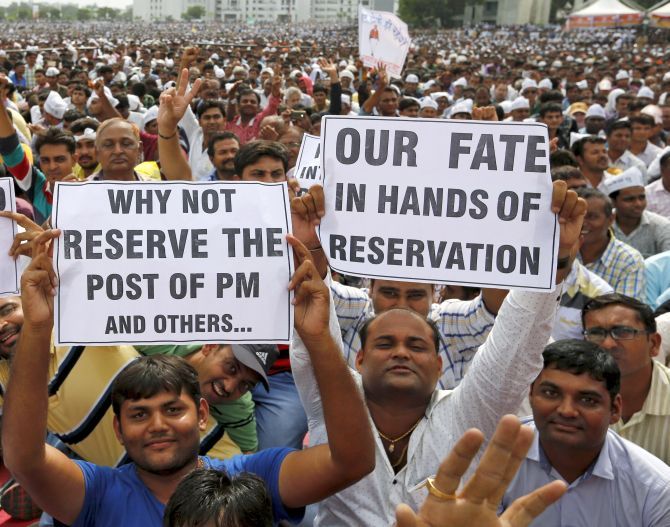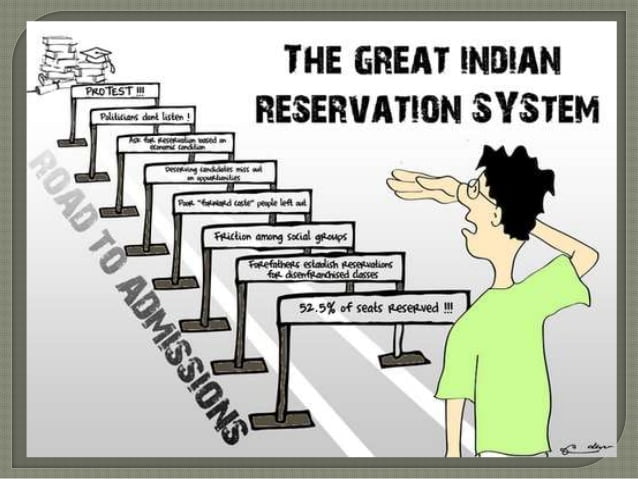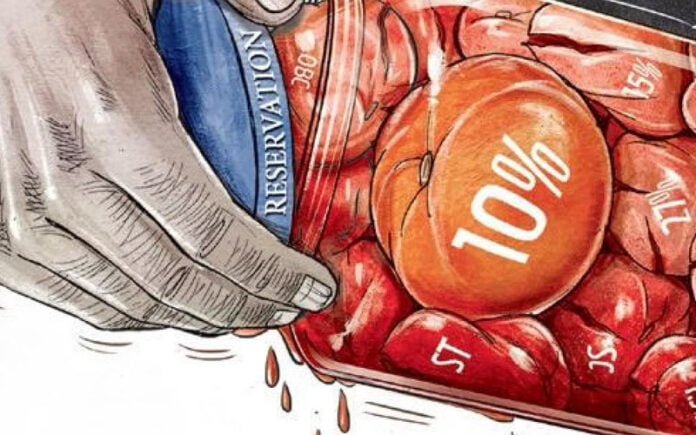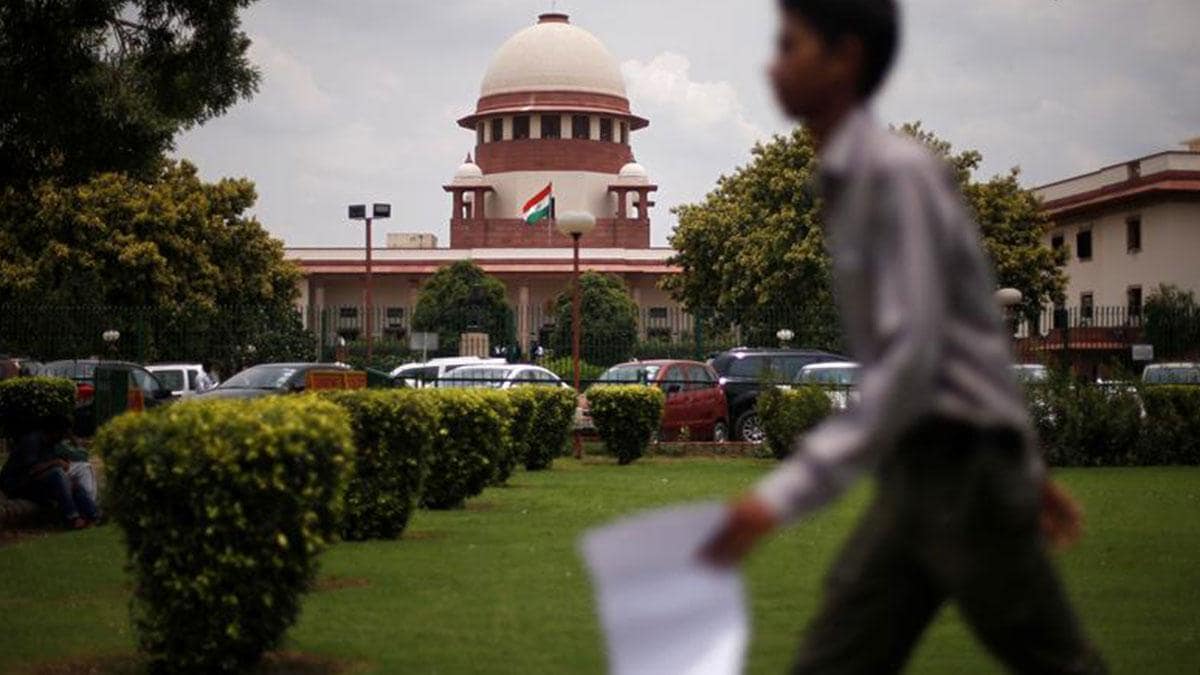The passing of the 103rd amendment on the 7th of November has once again opened debate on reservation in publicly funded educational institutions and government jobs. The 103rd amendment was passed in January 2019, stating that the EWS had a 10 per cent reservation for admission to government jobs and educational institutions.
Under the EWS quota,”Persons belonging to the general category with an annual gross household income of up to Rs 8 lakh are eligible for the reservation, excluding families that own over 5 acres of agricultural land, a house over 1,000 square feet, a plot of over 100-yards in a notified municipal area or over a 200-yards plot in a non-notified municipal area.” Further, Articles 15(6) and 16(6) were inserted to the Indian constitution, expressing the intent of the amendment. The amendment empowered state governments to provide reservations in college admissions and government jobs based on criteria of ‘economic backwardness.”

Subsequently, the EWS quota was challenged by 40 petitioners on the grounds that the quota was an attack on the constitutional vision of social justice and it was also called a fraud on the constitution. Petitioners argued that the quota would hinder equality of opportunities, violate the basic structure of the constitution and was fundamentally against the provision of the Mandal commission that put a 50-cent cap on all reservations.
“The impugned amendment enabling the State to make special provisions for the ‘economically weaker sections of the citizens other than the scheduled castes/scheduled tribes and socially and educationally backward classes of citizens, is required to be treated as affirmative action on the part of the Parliament for the benefit and for the advancement of the economically weaker sections of the citizens. Treating economically weaker sections of the citizens as a separate class would be a reasonable classification, and could not be termed as an unreasonable or unjustifiable classification, much less a betrayal of basic features or violative of Article 14.“
Justice Bela Trivedi
In its landmark judgment, the Supreme Court upheld the validity of the 103rd amendment. The bench consisted of Chief Justice UU Lalit, Justices Dinesh Maheshwari, S Ravindra Bhat, Bela M Trivedi and JB Pardi Wala. While the majority consensus upheld the EWS quota, a split verdict was witnessed. Justice Dinesh Maheshwari said that “In this country with a population of around 1.41 billion, the economic backwardness is not confined only to those who are covered by Article 15(4) or Article 16(4) of the Constitution. In a country where only a small percentage of the population is above the poverty line, to deny opportunities for higher education (which secures employment) and employment is to deny to those who are qualified and deserving what is or at least should be their due.”
Also read: Muslim Women In Indian Politics: Reservation Proposed by the AIMMM
He later added that “economically weaker sections of citizens are not a matter of mere semantics but is an expression of hard realities. Poverty is not merely a state of stagnation but is a point of regression.”
In order to fully understand the reservation debate, it needs to be understood that there are two factors at play here. One of ascribed status and the other of achieved status. The former is where an individual has no control over their attainment. A person is born to a particular caste and society then dictates the treatment he/she /they receives. Whereas achieved status is acquired via education, merit and one’s individual agency. Interestingly, being born in abject poverty is not particularly ascribed status, as a person can attain financial stability and nor can one call economic status an achieved status as a person might slip into poverty after being born rich.

Therefore, it becomes important to distinguish between economic backwardness and social backwardness, as a multiplicity of factors can add to one’s economic status. In this regard Justice Bela Trivedi claimed in her judgement that “The impugned amendment enabling the State to make special provisions for the ‘economically weaker sections of the citizens other than the scheduled castes/scheduled tribes and socially and educationally backward classes of citizens, is required to be treated as affirmative action on the part of the Parliament for the benefit and for the advancement of the economically weaker sections of the citizens. Treating economically weaker sections of the citizens as a separate class would be a reasonable classification, and could not be termed as an unreasonable or unjustifiable classification, much less a betrayal of basic features or violative of Article 14.“
Also read: Reservations For OBCs In Medicine: The Benevolent Casteism In Upper Castes’ ‘Merit’ Argument
It can be argued that a significant shift is witnessed from the passing of this judgement as reservation based on caste is subject to the injustice faced on account of discriminatory social treatment however that of economic status is based on individual deprivation.
According to a report, comparing reservation based on caste to that of economic status is similar to comparing apples with oranges as the caste-based reservation was meant to annihilate castes by helping members of the backward class to economically gain and overcome caste barriers however ‘The EWS category completely alters this framework. An individual family, which is the basic unit for the EWS category, is not analogous to a caste or tribe.’

Another flaw in this line of reasoning is that, By having an ‘individual’ as a basis for reservation, a degree of ambiguity and arbitrariness can follow as more quotas can be introduced owing to geography, limited access to urban amenities and availability of resources. Justice S Ravindra Bhat presented, referring to the Sinho Commission report, which shows that a large number of SC/ST population (38% of total SCs and 48% of STs) fell below the poverty line. “Bulk of economically deprived are these sections,” according to the bar and bench report.
In conclusion, the EWS quota brings a number of legal repercussions upon the courts and opens a new discourse for debate and discussion for the identification of the most suitable criteria for communities to enjoy state-enforced affirmative action. The judgement creates room for debate as several states are fighting to increase reservations for socially and economically backward classes beyond the 50% mark.
About the author(s)
Anshula Agarwal is a third-year student of Political Science currently based in Gurgaon and has an immense love for language, literature and movies. She comes across as witty, cheerful and a dedicated individual who is eager to learn things. Some of the things that interest her include basketball, cheesy romance novels, and good conversations.





Very reasoned criticism of EWS reservation which is against the constitutional spirit of Social and educational backwardness as a criterion for reservation.